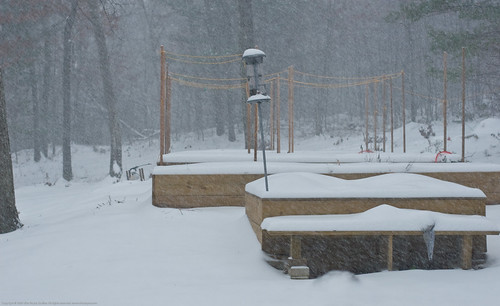
It is December 28th and our garden is buried under winter’s snow. Its quite a change from this last summer, huh?

Our chicken family has had it’s first tragedy with the death of a beloved silkie bantam, making my daughter Q very sad. We buried Snowball the silkie bantam with a ceremony of appreciation for her loving ways and the burning of dried sage. We were shin-deep in snow so the ceremony was a quick one.

We have been experiencing a good amount of snow and some interesting ice species. We had hoarfrost here last week, very interesting stuff.

Now that the fall holidays are out of the way, I am feeling a very strong urge to start the planning for our next growing season. We need to be efficient with our time and resources as we set up to start some plants indoors and also set up some heavy duty row covers out of doors for when the sun warms us a bit.
What I learned last summer with respect to our intensive raised bed growing:
- No corn in our planters
- No squash of ANY kind
- No delicate and overgrowing cherry tomatoes
- Grow all vine crops in designated non-bed growing area (more about this later)
- No snow peas
- Respect rigorously the projected height of plants and plant accordingly
- Get companions in early
- Use row covers on delicate crops for bugs from day one
- Grow for immediate use and not for storage (this is our family’s way and I dont see it changing fast)
- Plant a kid garden to allow younger kids to grow and futz with their own
- Plant chicken feed cover crops to fill in between grow seasons and also between crops and companions
- Plant many more marigolds
- Get those marigolds started as early as possible
- Grow tomatillos as pollinator attraction but not IN the beds
- Grow tomatoes in lower beds, not main beds
- Grow lots of pick-again crops like lettuces (this is what this family likes the best)
- Grow cucumbers in non-bed areas
- Grow more pollinator-attractive flowers in and around main beds
Animal predators were not a problem at all!
Thats just a few of my lessons! I can tell you that organic gardening is the ONLY way for me because I can not feed my kids veggies made toxic by chemicals, just can’t. Although I am a scientist (or perhaps because of it?) I find the thought of figuring out the right pesticide and how much etc etc tedious and makes me anxious of overdose (as well the potential for a child or pet to eat the stuff by accident).

In terms of what we will grow this year, think delicate leaves, plump tomatoes, crispy radishes, ponderous pumpkins, squashes and cucumbers, delicious green beans, tasty herbs.
Our raised beds will be bursting with mescluns and other greens, peppers, carrots, beets, beans, chickpeas, onions, eggplants, broccolis, rabes, bok choys, and more.
I am hungry just thinking about it all!.

















Thanks for posting your link at Martha’s site. Love the site!
Carolyn: Thanks for visiting!
Hi,
Found you from the Martha Stewart blog. If it’s ok would like to ask you a few questions regarding the construction of your raised beds.
Will wait for your reply.
Best,
Pauline
Your raised beds are beautiful! I love it when veggie gardens are attractive AND productive! Thanks for visiting my new site…it’s not much to look at right now, but I hope to document our progress and keep notes of my research there. Thanks for the potato tips…they will be one of our early crops as well. Oh…and your photos are breathtaking! Have a blessed New Year!
Stephanie: Gosh thanks! Well, the beauty is a wonderful side part of it but we are not very good at exterior decorating *winks* so its serendipity that it looks good Glad you like the shots. Growing things and bugs are amazingly photogenic things, if a bit hard to capture on a windy day.
Glad you like the shots. Growing things and bugs are amazingly photogenic things, if a bit hard to capture on a windy day.
I am looking outside right now and we have had quite a snow today and now we seem to have an ice fog moving in… weird stuff and nothing green!
I hope that this year’s growing season doesn’t get started too late because I am ALREADY hopelessly wanting to get to it.
Thanks for stopping by!
Hi Nika
I clicked on to your link from The Martha Blog and found your site to be lovely and informative.
I live in the south west of England and we would love to have snow like you have! We champion organic gardening and I find that the HDRA at http://www.gardenorganic.org.uk is a really useful resource as well as the RHS at http://www.rhs.org.uk .
I like the design of your raised beds something we will be constructing in the Spring 2008 I am already salivating on the thought of home grown veggies!. I will look forward to reading your blog in the future.
Regards Jo Coomber
Hi-
I too saw your link on Martha’s blog and was very excited because I am in the early stages of planning a raised bed garden. I would really like to hear more about your construction of the beds and what materials you used? How high should be beds be? I also plan to only use organic materials so any suggestions on getting the process moving along would be great. Warm regards from Atlanta.
Could you share how your vertical garden supports were created? We’ve built and filled our raised beds…the next step is to construct vertical supports for pole beans, sweet peas, etc. and we’re trying to decide on the best way to go about it…
Stephanie – we used 2x2x8 cedar elements (which did get stressed out from the weight) and then strung up ropes and string.
This year I am going to do something similar but not in the beds.
Kellie: living in Hotlanta, you have a nice LONG season! I never gardened when I lived in Atlanta and Athens so I do not know the challenges first hand.
We made our beds 2 feet high because we decided on that luxury – I figured (rightly so) that gardening would be better for my non-nimble back if the beds were higher. Square-foot gardening suggests a minimum of 1 foot.
There are several posts on this blog on the making of the beds and also you can look at this flickr set http://flickr.com/photos/nika7k/sets/72157600218530516/ that has the images in one place (lots of other garden related ones too)
We used pressure treated wood because we do not have the money to remake these beds often but we lined the interior with plastic to keep out the leaching chemicals.
We are not super handy types but my husband did it and looks like he did a good job.. I suggest that you do the same! Dont pay a contractor to do what you can do!
we did the same with our chicken house.
Jo, thank you so much for writing and for the links!! I love the whole allotment movement in the UK, neat stuff. I wish Americans were more into it.
I grew up in the mid-west (70s) where everyone it seems had a garden or grew up with one themselves. Here in the Northeast, its a much more rare thing. We all have great lawns but they are all poisoned with chemicals and turf. The onlything for them squarefoot gardening, bringing in fresh soil.
I will take a closer look at your links and be sure to stop back by with an update on your garden!
So as another 8 inches of snow is falling today, I’m consoling myself and dreaming of spring by spending time in my seed catalogs and in my gardening books. I love reading your notes about what you’ve learned and what you will and will not do again.
I do have a question for you regarding your raised beds. How are you going to prepare them for planting again? Are you planning to till them by hand, or do you have a small tiller? As I’m planning for the future, I love the idea of your multiple raised beds, but can’t figure out for the life of me how you’d till them…
I know how it is, we are under ice, cars cant make it up the driveway.
I will not till the soil other than to get any major chunks out (like really big roots). I want to establish a diverse soil structure that isnt tilled every year (no-till method). I will likely overlay some more soil because there has been some settling.
see:
http://en.wikipedia.org/wiki/No-till_farming
http://www.eartheasy.com/article_no-till_gardening.htm
Very cool info Nika! Thank You!